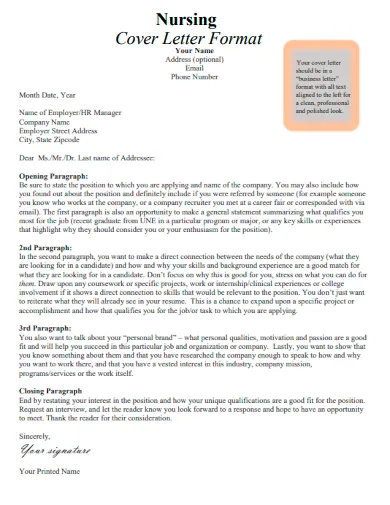What is a Nursing Cover Letter
A nursing cover letter is a crucial document that accompanies your resume when applying for nursing positions. It serves as a personalized introduction, allowing you to showcase your qualifications, experience, and passion for the nursing profession. Unlike a resume, which provides a factual overview of your background, a cover letter gives you the opportunity to tell your story, explain why you’re the ideal candidate, and demonstrate your understanding of the specific role and the healthcare organization. A well-crafted nursing cover letter can significantly increase your chances of securing an interview, making it an essential part of your job application strategy. Think of it as your first impression, a chance to make a compelling case for why you deserve the job and what unique value you bring to the team. It’s not just about repeating your resume; it’s about connecting with the hiring manager on a personal and professional level.
Why is a Nursing Cover Letter Important
In the competitive field of nursing, a cover letter can make or break your application. It provides a platform to highlight your relevant skills and experiences, demonstrating how they align with the specific requirements of the job. A cover letter also allows you to address any potential gaps in your resume or explain career transitions. Furthermore, it showcases your writing and communication skills, which are essential in nursing. It’s your chance to express your enthusiasm for the role and the organization, demonstrating that you’ve done your research and are genuinely interested in the opportunity. By personalizing your cover letter for each application, you show the hiring manager that you’re serious about the position and have taken the time to understand their needs. A strong cover letter can differentiate you from other applicants and make a lasting positive impression, ultimately increasing your chances of getting an interview and landing your dream nursing job.
Key Components of a Nursing Cover Letter
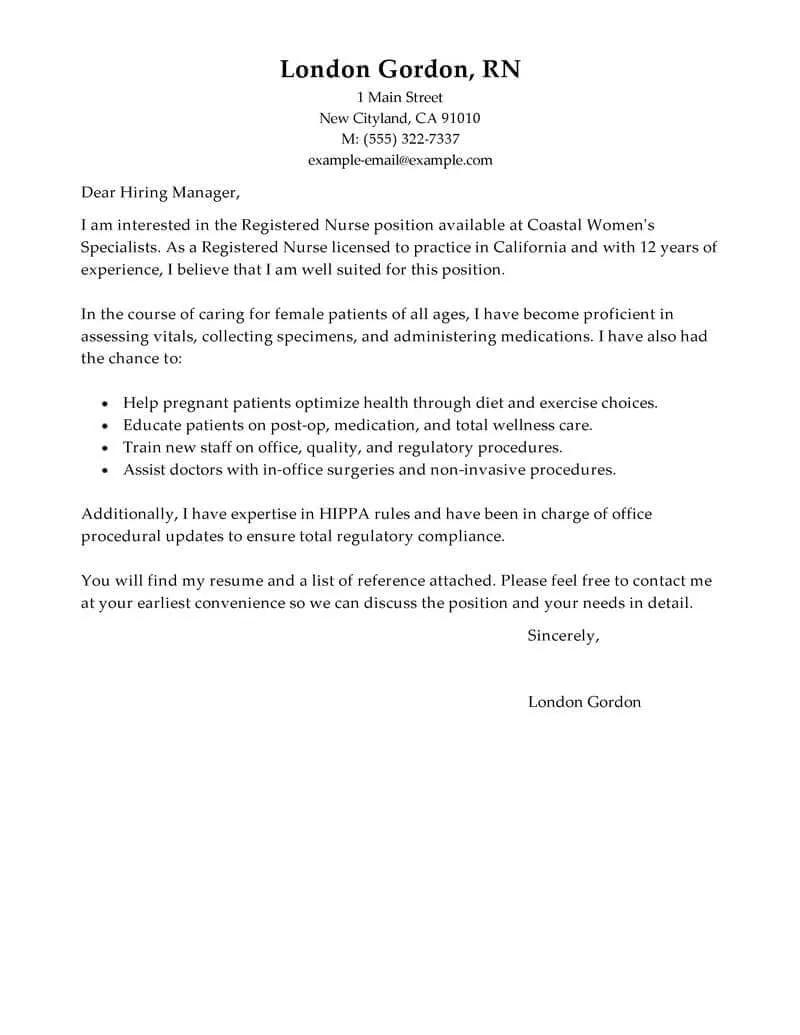
A well-structured nursing cover letter follows a clear format, including key components to effectively communicate your qualifications. Each section plays a vital role in presenting you as a strong candidate. Understanding and incorporating these elements is crucial for making a positive impact on the hiring manager. By adhering to these guidelines, you ensure your application is both professional and compelling, giving you the best possible chance to stand out. From the header to the closing, each part contributes to the overall effectiveness of your message, making it clear why you are the perfect fit for the role.
Header and Contact Information
Begin with a professional header that includes your full name, address, phone number, and email address. This information should be clearly presented at the top of the page, making it easy for the hiring manager to contact you. Ensure your email address is professional and appropriate for job applications. Also, include the date and the recipient’s contact information, such as the hiring manager’s name, title, and the organization’s address. Using the correct formatting and including all necessary details shows attention to detail and professionalism, which are essential qualities in the nursing field. Double-check all information for accuracy before submitting your application, as any errors can reflect poorly on your candidacy. This ensures you’re easily reachable and demonstrates your commitment to professionalism.
Greeting
Start your cover letter with a professional greeting. Whenever possible, address the hiring manager by name. Research the organization to find out the name of the person responsible for hiring. If you are unable to find the name, using a general greeting like “Dear Hiring Manager” or “Dear [Department Name] Hiring Committee” is acceptable. Avoid generic greetings like “To Whom It May Concern,” as they can make your application seem impersonal. Using the hiring manager’s name shows that you’ve taken the time to learn about the organization and are genuinely interested in the position. This personal touch can make a positive impression and set your cover letter apart from others.
Opening Paragraph
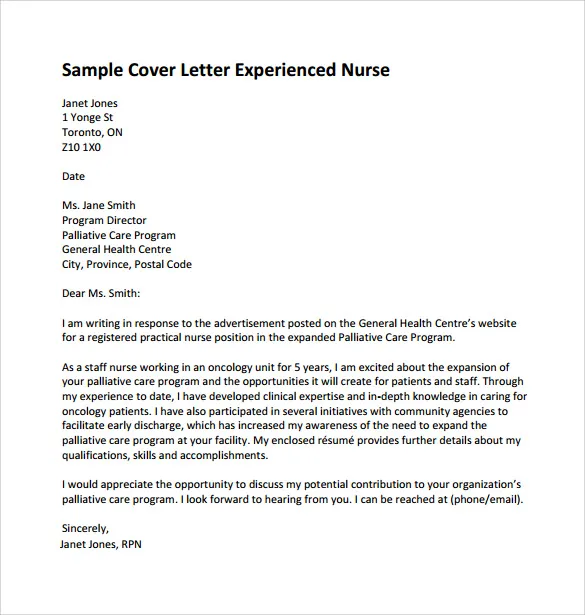
The opening paragraph of your nursing cover letter is your chance to grab the hiring manager’s attention. Start by clearly stating the position you are applying for and where you found the job posting. Briefly mention your key qualifications and your enthusiasm for the role. Express your interest in the specific opportunity and the organization. Highlight a relevant skill or experience that immediately demonstrates your suitability for the position. Keep it concise and impactful, setting the tone for the rest of your letter. Your opening paragraph should make the hiring manager want to read more and learn about what you have to offer.
Body Paragraphs
The body paragraphs form the core of your cover letter, where you expand on your skills, experience, and qualifications. Use these paragraphs to showcase how your background aligns with the requirements of the job. Provide specific examples from your past roles to illustrate your abilities. Each paragraph should focus on a specific aspect of your qualifications. Use keywords from the job description to highlight your relevant skills and experiences. The goal is to convince the hiring manager that you are the perfect fit for the position. Ensure your writing is clear, concise, and easy to read. Aim to make a strong and memorable case for your candidacy. The body paragraphs are your opportunity to connect your experience with the job requirements.
Highlighting Skills and Experience
In your body paragraphs, focus on the skills and experiences that are most relevant to the job description. Match your skills to the job requirements by reviewing the job posting and identifying the key qualifications. Provide specific examples of how you have demonstrated these skills in previous roles. Use the STAR method (Situation, Task, Action, Result) to structure your examples, providing clear and concise stories. Emphasize your clinical skills, patient care abilities, and any specialized training or certifications you possess. Highlight any leadership roles or experiences where you have managed teams or projects. By clearly illustrating your skills and experiences, you show the hiring manager that you are a capable and well-suited candidate for the position. Always tailor your examples to the specific requirements of the job to show you understand the role.
Quantifying Achievements
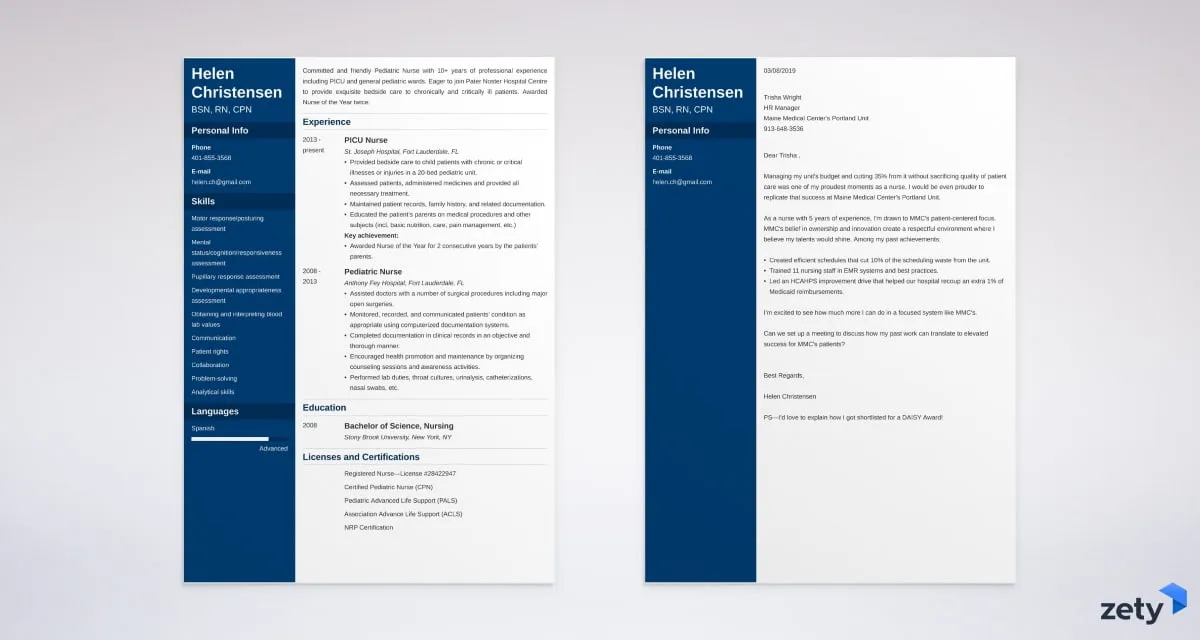
Quantify your achievements whenever possible to demonstrate your impact. Instead of simply stating that you improved patient outcomes, provide specific numbers. For example, “Reduced patient fall rates by 15% through implementation of a new safety protocol.” Use metrics such as percentages, numbers of patients, or time saved to illustrate your accomplishments. Quantifying your achievements makes your claims more credible and demonstrates your ability to produce results. This evidence-based approach strengthens your cover letter and shows the hiring manager the value you bring to the organization. By using data, you make your accomplishments more impactful and easier for the reader to understand your contributions. Quantifiable results set you apart from other candidates.
Tailoring the Cover Letter to the Job
Customizing your cover letter for each job application is essential. Carefully review the job description and identify the specific requirements and preferences of the hiring manager. Align your skills, experience, and qualifications with those requirements, emphasizing the most relevant aspects of your background. Research the organization to understand its mission, values, and culture. Use this information to demonstrate why you are a good fit for the organization. Avoid using a generic cover letter; instead, personalize it to showcase your understanding of the role and the organization. Tailoring your cover letter shows that you are genuinely interested in the position and have taken the time to prepare a targeted application, making you stand out from other applicants.
Closing Paragraph
Your closing paragraph should summarize your interest in the position and reiterate your enthusiasm. Express your appreciation for the hiring manager’s time and consideration. Clearly state your availability for an interview and how they can reach you. Reiterate your interest in the opportunity and why you believe you are a good fit for the role. End with a professional closing, such as “Sincerely” or “Best regards,” followed by your full name. Avoid clichés and instead focus on leaving a positive and memorable impression. The closing paragraph provides a final opportunity to reinforce your key selling points and thank the hiring manager for their time. Make sure to express your eagerness for the next steps in the hiring process.
Formatting and Tone
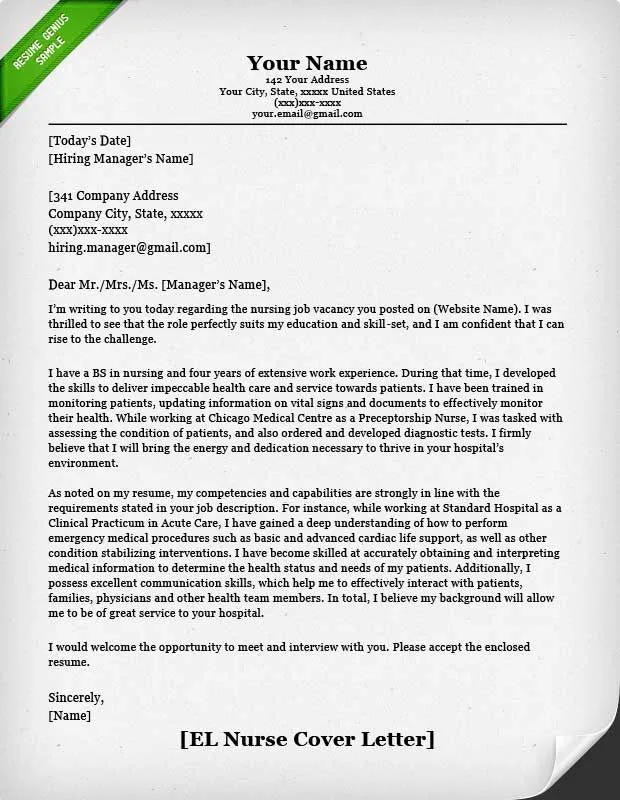
The formatting and tone of your nursing cover letter are crucial for making a professional impression. Proper formatting ensures your letter is easy to read and visually appealing. The tone should be professional, enthusiastic, and aligned with the nursing profession. Paying attention to these details enhances your overall presentation, making it easier for the hiring manager to focus on the content of your letter.
Formatting Guidelines
Use a professional and easy-to-read font, such as Times New Roman, Arial, or Calibri, with a font size between 10 and 12 points. Maintain consistent formatting throughout the letter, including spacing, margins, and alignment. Use single spacing within paragraphs and double spacing between paragraphs. Set 1-inch margins on all sides of the document. Avoid excessive use of bolding, italics, or underlining. Break up long blocks of text with shorter paragraphs and bullet points when appropriate. Ensure your cover letter is well-organized and visually appealing, making it easy for the hiring manager to read and understand. A clean and well-formatted cover letter shows attention to detail and professionalism.
Tone and Language
Maintain a professional and enthusiastic tone throughout your nursing cover letter. Use clear and concise language, avoiding jargon or overly technical terms. Highlight your passion for nursing and your genuine interest in the position and the organization. Use action verbs to describe your skills and experiences, such as “managed,” “implemented,” “coordinated,” and “achieved.” Be confident but avoid sounding arrogant. Showcase your personality and enthusiasm for the nursing field, but remain professional and respectful. Ensure your language is positive and reflects your dedication to patient care and teamwork. The tone should reflect your commitment to the nursing profession and your interest in the specific opportunity.
Proofreading and Editing
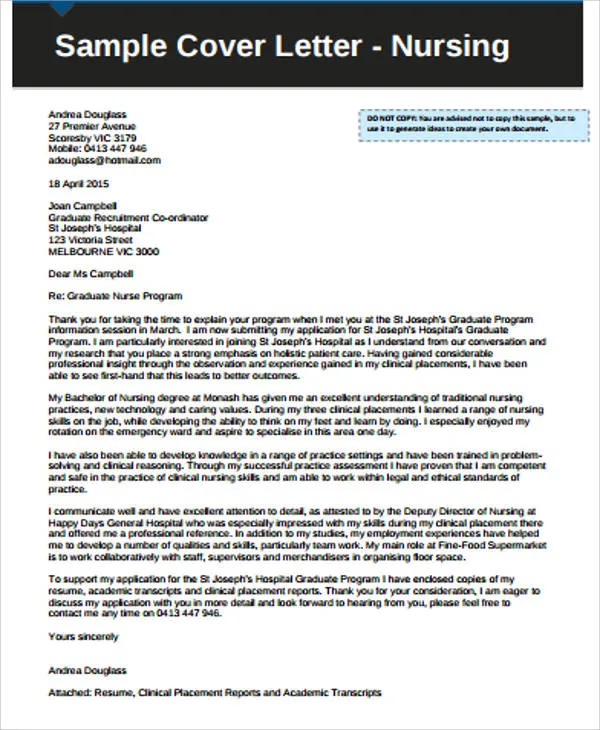
Proofreading and editing your cover letter is critical to ensuring it is free of errors. Before submitting your application, carefully review your letter for any grammatical errors, typos, or punctuation mistakes. Use a grammar and spell-checking tool, but also read the letter carefully yourself. Ask a friend, family member, or career advisor to review your cover letter for a second opinion. Ensure your writing is clear, concise, and easy to understand. Correct any inconsistencies in formatting or style. A well-proofread cover letter demonstrates attention to detail and professionalism, making a positive impression on the hiring manager. A polished and error-free cover letter reflects positively on your capabilities and commitment to excellence.
Common Mistakes to Avoid
Avoid these common mistakes to ensure your nursing cover letter makes a strong impression. Don’t use a generic cover letter; always tailor it to each job application. Avoid repeating information directly from your resume; instead, use the cover letter to elaborate on your skills and experiences. Don’t use clichés or overly formal language. Avoid grammatical errors, typos, and punctuation mistakes. Don’t focus solely on your needs; instead, emphasize how you can contribute to the organization. Avoid negative language or complaining about previous employers. By avoiding these common pitfalls, you will significantly increase your chances of success. Focusing on these areas can help you avoid common mistakes and make a positive impression.
